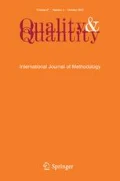Abstract
Given that the use of Likert scales is increasingly common in the field of social research it is necessary to determine which methodology is the most suitable for analysing the data obtained; although, given the categorization of these scales, the results should be treated as ordinal data it is often the case that they are analysed using techniques designed for cardinal measures. One of the most widely used techniques for studying the construct validity of data is factor analysis, whether exploratory or confirmatory, and this method uses correlation matrices (generally Pearson) to obtain factor solutions. In this context, and by means of simulation studies, we aim to illustrate the advantages of using polychoric rather than Pearson correlations, taking into account that the latter require quantitative variables measured in intervals, and that the relationship between these variables has to be monotonic. The results show that the solutions obtained using polychoric correlations provide a more accurate reproduction of the measurement model used to generate the data.
Similar content being viewed by others
References
APA, AERA, NCME: Standards for Educational and Psychological Testing. Washington, Author (1999)
Bollen K.A.: Structural Equations with Latent Variables. Wiley, New York (1989)
Coenders G., Saris W., Satorra A.: Alternative approaches to structural equation modeling of ordinal data: a Monte Carlo study. Struct. Equ. Model. 4(4), 261–282 (1997)
Cliff N., Kyats J.A.: Ordinal measurement in the behavioural sciences. Lawrence Erlbaum, New Jersey (2005)
Cronbach L.: Essentials of Psychological Testing. Harper and Row, New York (1984)
DiStefano C.: The impact of categorization with confirmatory factor analysis. Struct. Equ. Model. 9(3), 327–346 (2002)
Dollan C.V.: Factor analysis of variables with 2,3,4 and 7 response categories: a comparison of categorical variables estimators using stimulated data. Br. J. Math. Stat. Psychol. 47, 309–326 (1994)
Flora D.B., Curran P.J.: An empirical evaluation of alternative methods of estimation for confirmatory factor analysis with ordinal data. Psychol Meth 9, 466–491 (2004)
Flora B.F., Finkel E.J., Foshee V.A.: Higher order factor structure of a self-control test: evidence from confirmatory factor analysis with polychoric correlations. Educ. Psychol. Meas. 63(1), 112–127 (2003)
Göb, R., McCollin, C.H., Ramalhoto, M.F.: Ordinal methodology in the analysis of Likert scales Quality & Quantity (M.F.)
Guilley W., Uhlig G.: Factor analysis and ordinal data. Education 114(2), 258–264 (1993)
Holgado F.P., Chacón S., Barbero I., Sanduvete S.: Training satisfaction rating scale: development of a measurement model using polychoric correlations. Eur. J. Psychol. Assess. 23(4), 268–279 (2006)
Holgado, F.P., Carrasco, M.A., del Barrio, M.V., Chacón, S.: Factor analysis of the big five questionnaire using polychoric correlations in children. Qual Quant Int. J. Meth. (2007)
Jöreskog, K.G.: Analysis of ordinal variables 2. Cross-Sectional Data. Text of the workshop “Structural equation modelling with LISREL 8.51”. Friedrich-Schiller-Universität, Jena (2001)
Jöreskog K.G., Sörbom D.: LISREL 8: User’s reference guide. Scientific Software International, Chicago (1996a)
Jöreskog K.G., Sörbom D.: PRELIS 2: User’s reference guide. Scientific Software International, Chicago (1996b)
Kampen J., Swyngedouw M.: The ordinal controversy revisited. Qual. Quant. 34, 87–102 (2000)
Maydeu A., D’Zurilla T.J.: A factor analysis of the social problem-solving inventory using polychoric correlations. Eur. J. Psychol. Assess. 11(2), 98–107 (1995)
Messick S: Foundations of validity meaning and consequences in psychological assessment. Eur. J. Psychol. Assess. 10(1), 1–9 (1994)
Saris W., Van Wijk T., Scherpenzeel A.: Validity and reliability of subjective social indicators. Soc. Indic. Res. 45, 173–199 (1998)
Shadish W.R., Cook T., Campbell D.: Experimental and quasi-experimental design for generalized causal inference. Houghton-Mifflin, Boston (2002)
Author information
Authors and Affiliations
Corresponding author
Additional information
The present study forms part of the results obtained in research project SEJ2004–05360/EDUC funded by Spain’s Ministerio de Educación y Ciencia.
Rights and permissions
About this article
Cite this article
Holgado–Tello, F.P., Chacón–Moscoso, S., Barbero–García, I. et al. Polychoric versus Pearson correlations in exploratory and confirmatory factor analysis of ordinal variables. Qual Quant 44, 153–166 (2010). https://doi.org/10.1007/s11135-008-9190-y
Published:
Issue Date:
DOI: https://doi.org/10.1007/s11135-008-9190-y



